Departing Q-C Community Foundation CEO to Form a New, Bold Venture
For the past seven years, Sherry Ristau has focused on transforming the Quad Cities Community Foundation. After Friday, when she leaves as president/CEO, the 60-year-old will focus on transforming herself.
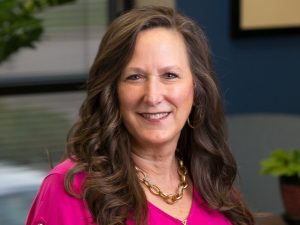
Sherry Ristau is stepping down Aug. 27 as president/CEO of the Quad Cities Community Foundation after seven years.
“When I arrived in the Quad-Cities, I was welcomed as the new leader of this organization with overwhelming warmth and openness. That’s a testament to the good will of this community, but it speaks to something else equally important for our future: our willingness to embrace change and the chance to improve—to transform ourselves for the better,” Ristau said in a blog post Tuesday.
“This drive to challenge the status quo has inspired me from the start. I saw it in the preparations for the I-74 bridge connecting our two states—how we were willing to invest not only resources but also energy and patience, how we were willing to make necessary sacrifices for the sake of the greater good and the longer-term future,” she wrote. “Construction may still
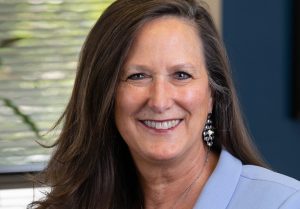
Ristau, 60, plans to start a new leadership development company called Amethyst Bold.
be under way, but when the bridge is completed, it will stand as proof that we can transform our region in ways that bring us all closer together.
“Our work at the Community Foundation embodies these same principles. From Transformation Grants to scholarships, we have sought out new and better ways to improve life for every Quad Citizen today and in the generations to come,” Ristau said. “By truly putting ourselves out in the community and listening, we have earned the trust of leaders and donors to guide generosity at the intersection of individual and community philanthropic goals and the most pressing needs and promising opportunities, which keep evolving as we do.”
“Over the past seven years, we’ve assembled a fantastic leadership team and staff who have been so instrumental in moving our work forward,” she said. “As I look back on my time at the Community Foundation, I know that all the good
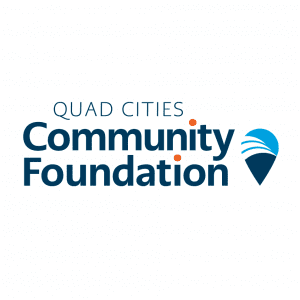
The Foundation, which formed in 1964, has grown in assets since 2014 from $112 million to $182.6 million.
that has happened is a result of our entire team—and the community—coming together to further generosity in the region.”
The Foundation’s mission is “to transform the region through the generosity of donors,” according to www.qccommunityfoundation.org.
“And that’s why we work—day in and day out—to be the trusted place where generous people in the Quad-Cities (and beyond!) make gifts to support their community, specific organizations and causes most important to them,” the site says. “We are an independent, public charity with a team of Quad Citizens committed to listening to our donors’ charitable goals, and then working alongside them to help them best meet their hopes and dreams.
Through gifts and funds established at the Quad Cities Community Foundation by donors, for our community, it awards grants and scholarships to people and organizations residing primarily in Rock Island County and Scott County. Through the network of Geographic Affiliate Funds and Community Funds, they also serve the residents and needs of surrounding counties.
Randy Moore, foundation board chairperson, will take over as interim president and CEO and work very closely with vice presidents and staff until a successor has been named.
“Sherry has hired and led a high-performing team of professionals who love their work, love their community, and are quite frankly, whip-smart,” Moore said. “We are positioned so well to take this work to the next level. I’m looking forward to working more closely with the team
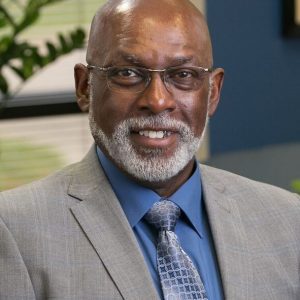
Foundation board chairman Randy Moore, will serve as interim chief executive until a new successor is chosen.
in the months ahead.”
Moore first served on the board of directors from 2011-2012, and then rejoined in 2014 because he saw in Ristau—and in the Community Foundation—a leader doing the work necessary to power philanthropy in the Q-C region.
“Under Sherry’s thoughtful leadership, the Community Foundation has grown in donor contributions, grants awarded out into the community, and regional reputation and awareness,” he added.
Before moving to the Q-C, she led the Southwest Initiative Foundation in rural (very white) Minnesota for 17 years, serving an 18-county area of about half the population of the Q-C area. There, Ristau oversaw over $70 million in assets, with grants and loans exceeding $5 million per year. “Some of the best friends and the people I’ve learned the most from are Quad Citizens who are people of color,” she said Tuesday. “I’ve gone to conferences to learn more about what other cities are doing for equity and inclusion or just to make their cities better. And I have learned

The Community Foundation leadership team consists of Sherry Ristau, left, Kelly Thompson, Anne Calder, and Michelle Payne.
the most from them about how to be a better leader. So, I’ve learned about what’s most important in community, in our organizations, our businesses. I’ve learned a ton.” When Ristau leaves Friday, the Foundation has a new three-year strategic plan in place that’s been approved by the board and it continues to have a devotion to boosting diversity, equity and inclusion. “We changed our bylaws to include an equity and inclusion board committee,” she said. “It’s a very intentional awareness and lens through which we look at everything we do at the Community Foundation.” The priority on diversity, equity and inclusion (DEI) applies to their staff, investments, how they operate, and how they make grants, Ristau said. In November 2018 (more than a year and a half before the George Floyd murder and racial justice protests), the Foundation board adopted a strong commitment to DEI.
“Quite simply, we at the Community Foundation can’t fulfill our mission unless all people in the Quad Cities area have the opportunity and support to make their lives and our community the best they can be,” it says on part. “For that reason, we have made a commitment to embrace an approach to all our work that is intentionally diverse, inclusive, and considers the impact of our actions on equity.”
In a bitterly divided, hyper-partisan nation, she noted the Q-C seems more united than the United States overall. “We are absolutely more united and together. I believe, however, we are part of a greater country and we’re two states,” Ristau said. “We’re two different states, two different governors, two different political thought processes of governors. And, there are times that I felt, we were more divided than we were united during Covid-19. It’s at the local level, the core of a local community.” “We need to care about each other, and I believe that in the Quad-Cities, we do care about each other and even our elected officials, it would seem would be divided at times,” she said. “But at the end of the day, I believe all of us, including our elected officials, really do care about each other…It’s so cliche but we are so much better together than apart.”
Accomplishments and a new company
Ristau said that there are things she accomplished here and in Minnesota that she’ll want to continue in a new company she’s launching, called Amethyst Bold.

According to the Community Foundation, it truly takes a village to raise a community — through care, connection, cooperation, collaboration, and celebration.
“I am a Christian. I’m a woman of faith and Amethyst is my birthstone,” she said of the February stone. “And it’s purple and purple biblically represents royalty. And then in Biblical times, that would have been leadership.”
Her services are yet to be determined, but Ristau said it will be “a relationship-based leadership company that facilitates and helps leaders be bold and audacious.”
“For me as a leader and for how long I’ve been blessed, so many years both in Minnesota and now the Quad-Cities with really incredible leadership opportunities. And to really be a successful leader, I’ve needed to be confident and courageous,” she said. “And I’ve needed connections, and those connections for me are not just connections in the community I live in.
It goes way beyond that. When Ristau came to the Q-C, she was on the board of the Council on Foundations and had colleagues from all different types of foundations “that encouraged me, gave me confidence, helped me be courageous, help me think right,” she said.
“Helped me really think through how to do that, because we made a lot of changes at our Community Foundation here in the Quad-Cities. And I really wanted to do it right. I wanted to really do it right for people — for the board, for the staff, for the community.”
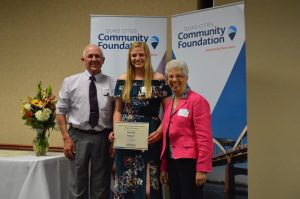
One of the many annual scholarship recipients from the Community Foundation, in 2019. The Foundation gives out an average of nearly $600,000 in scholarships a year.
Since she’s been at the Foundation, its total assets grew from $112 million to over $182 million, but for her, it’s not about the money.
“The money is great. Don’t get me wrong,” Ristau said. “The money is great, and it is certainly a sign of success, but the greatest success is about the people. And the relationships and people are what drive me and give me energy.”
“First and foremost is the team and the culture here at the Community Foundation. To me, that is one of my greatest assets. The team here is outstanding and they’re professional. “They are very cooperative, you know, we want to cooperate. We want to connect with as many people, organizations, leaders, donors,” she said. “I mean, we want to connect with as many Quad Citizens as we possibly can, to collaborate to ultimately celebrate the success of our community.” Her team has supported her just as strongly.
We made some important strides in our organizational identity,” said Anne Calder, vice president of development, recalling that one of Ristau’s first priorities upon joining the Community Foundation in 2014 was to work with the board of directors to bring the community together around a new mission: to transform the region through the generosity of donors.
In addition to that, Ristau and her team undertook a rebranding effort, renaming the organization from the Community Foundation of the Great River Bend to the Quad Cities Community Foundation in order to strategically sharpen its regional focus.
“This effort was crucial for the trajectory of our organization, building both awareness and an understanding of what we do, why we do it, and how our community can be part of it,” said Calder. “That’s meant growing not just our reputation but also our donor base and donor services. Donors can see our commitment to stewarding—and championing—generosity in the Quad Cities.”
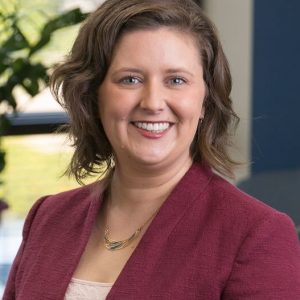
Kelly Thompson is the vice president for grantmaking and community initiatives.
Building on this foundation, the Community Foundation has also stepped up the scale and impact of its grantmaking in the region, according to Kelly Thompson, vice president of grantmaking and community initiatives. One notable development, she said, was Ristau’s introduction of annual Transformation Grants, grants of $100,000 or more to make a major investment in an effort that helps transform our region.
Over $1 million has been granted to date to efforts expanding equitable economic development, laying groundwork for broadband internet access for students, reimagining of mental health and family service systems, and more. In addition, by twice activating the Disaster Recovery Fund in response to the 2019 Mississippi River flood and the Covid-19 pandemic, the Community Foundation was able to raise and grant out more than $2 million to support the community in crisis.
“In Sherry’s time, we’ve been able to award more grants in the community than ever before,” said Thompson. “To see our organization and our community rise to the occasion with such generosity and collaboration has been remarkable. It shows us just how much we’re capable of going forward.”
“What can we invest, in fact, that will move the needle on something really important to our regional community,” Ristau said of the need for Transformation Grants. “We made grants for housing in the area of mental health. One grant that stands out to me ‘cause I love it, is the Mercado in Moline, to really and help them. They purchased a building to help make that more than just a summer event. If you really helped them build their capacity to expand what they do as a Mercado in our community, for our community.”
Though she’s proud of the impact of the Quad Cities Disaster Recovery Fund, Ristau said most people don’t realize that the fund was set up a

Like the long-awaited construction of the new I-74 bridge, the Quad Cities Community Foundation work requires many partnerships across both sides of the river, and is transforming the region.
few years before 2019 in partnership with other foundations, to be prepared for when disaster hits.
“Then the flood hit and we were ready,” she said. “What I’m most proud of isn’t just having the funds out of it. It’s about the responsiveness of the community, and giving to the fund. And then, of course after the flood, we had activated it again for the pandemic. And once again, and in an even bigger way, the community responded, and it was incredible.
“It was so humbling to be a part of that package and to see what people did to see our community come together,” Ristau said. “One hundred percent of every gift went right back out to the community to help those who were the most vulnerable, most affected by the by the flood and then the pandemic.
“Again, what most people don’t realize because of the pandemic, we had to go remote right? I was the staff person, I was in the position when the pandemic first hit, when you first started dealing with it — I got and I opened all mail and that meant opened all the checks and made the deposit at the bank,” she said. “So I was doing things the president doesn’t normally do, but it was crazy ‘cause there were hundreds, hundreds and hundreds of checks that came to the disaster fund at the Quad Cities Community Foundation. And because of staff being deployed and working out of homes, I was the one that went to the post office, picked up the mail, opened it and filled out the deposit slip the old-fashioned way.
“There were times when like, what am I doing? I have so many other things to do, right? And then I would open a check and it wasn’t just a check, there was a note with the check and that note thanking us for what we were doing. Then there were those who gave their whole stimulus check, and would write a note saying, we don’t need this. Please make sure it goes to people who need it.” “I can’t even put it in words,” Ristau said. “It has been such an honor to serve this community. I am forever grateful and forever blessed by all people of this community and everything that I’ve gotten to be a part of it is such a blessing to me and I’ve learned so much as well.”
Continuing to transform
It takes a village to raise up any community, and Ristau emphasizes it’s always been a collaborative effort – impossible for one person to
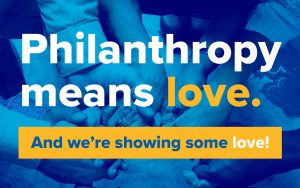
Sherry Ristau has been so impressed with the generosity of Quad Citizens the past two years, which she equates with love.
accomplish alone.
“Personally, I am ending my time as the leader of the Community Foundation changed for the better. The many new relationships I’ve made have expanded how I see the world and ignited my passion for the Quad-Cities,” she wrote in her farewell blog. “As a member of this community, I look forward to learning how I might continue to contribute, and I hope my path will continue to cross with many of yours as the Quad-Cities grows—in ways that can only be done with what I think of as the five C’s.
“It starts with care for each other and progresses from there to connection, cooperation, and collaboration. Finally, we must remember to celebrate each other’s successes together,” Ristau said. “Let’s stay focused and inspired, just as we did with the bridge, so we can continue transforming our region together.”
Of the 937 funds established at the Foundation, many donors have made unrestricted gifts to create collective impact on the most pressing needs and promising opportunities in our community, the Foundation website says. Some donors gift to continue to support a specific organization they believe in. Others support particular areas of interest in our community (arts and culture, early childhood education, the environment, or housing to name just a few) that matter to them—relying on the Community Foundation to guide how best to invest those funds into the community.
“We also listen, lead and act to amplify goodness in our community,” the site says. “That often means partnering with nonprofits and community leaders to improve our shared community by identifying current and emerging issues, channeling donor gifts to address community needs, and helping prepare for the future of our Quad-Cities region.”
Since 1964, the nonprofit has awarded $96.2 million in grants (and growing), and each year gives out nearly $600,000 in local scholarships.
From vice president of finance Michelle Payne’s perspective, underpinning these developments has been Ristau’s close attention to the
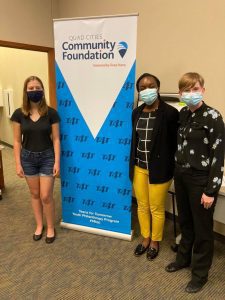
New participants in the Foundation’s Teens For Tomorrow (T4T) program, in which local students learn about the community’s needs and make decisions about how to allocate grant funding each year to meet those needs.
critical details that happen behind the scenes. For example, recently the Community Foundation revisited its investment structure, working alongside financial professionals from within the community to help lower expenses. This strategy results in an ongoing benefit for donors and local nonprofits alike as savings translate into additional grant dollars.
“We’ve really aligned our investment strategy with our mission and goals,” said Payne. “Donors feel confident knowing that their generosity is being managed in smart ways that maximize the impact in our community.”
Considering the Community Foundation’s rich potential for achieving even more in the years to come, Ristau pointed to the people she has spent her time there working alongside. “One of the most important things effective leaders can do is to bring together great people—a team that is talented and passionate, greater than the sum of its parts,” she said. “I can’t wait to see how they take this organization and our community to new heights.”
In July, Ristau outlined a strategic direction for the Foundation that also highlights transformation. “Behind every act of generosity is a story, an intention,” she wrote at https://www.qccommunityfoundation.org/news/2021/7/7/reaching-new-heightstogether. “Today, I can add that the same goes for the work of transformation. Without strategic priorities—a clear vision and a plotted course of action to make it happen—we can’t do justice to our mission to transform the region through the generosity of donors.”
She’s also proud of the name change from the Community Foundation of the Great River Bend. “The response we got from the community was so amazingly positive and very much wanting that change,” she said Tuesday. “It’s allowed us to really build. I think more people know about the Community Foundation today than they did when I came in 2014, and that’s what sets the foundation up for success in the future.”
The Foundation now is focused on a vibrant and inclusive Quad-Cities where all community members are engaged in building our future. They’re working to do that by:
- Connecting the generosity of the region to the mission of the Community Foundation.
- Demonstrating an ongoing foundational commitment to diversity, equity, and inclusion in the region.
- Engaging people more deeply to invest generosity at the intersections of what they care about and what their community needs.
Ristau also has helped transform the Foundation, from a set-in-its ways 50-year-old group in 2014, to something new, cutting-edge, and, well, bold. “It was a Community Foundation that was really focused on the transactions. We could move the needle from transaction to transformation, and I believe we have.” That’s something, ironically, that likely will not change.









